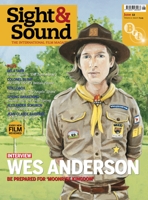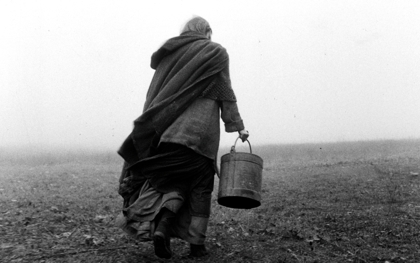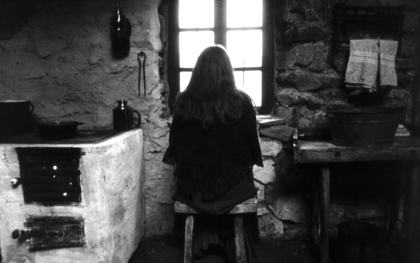Primary navigation


Hungary’s master of entropy Béla Tarr closes his own filmmaking career with a slow, stark parable of a horse on strike and the world caving in. It’s heartfelt – but a bit gloomy, says Kieron Corless
From our June 2012 issue
The inevitable question confronting any artist of stature as the twilight years close in: will the inspiration fade away; and if so when? And concomitantly: should I call time, and if so when? Some directors have of course produced great work near or right up to the end; others, arguably a larger cohort, have ploughed on (are ploughing on) regardless of – perhaps blissfully unaware of – pronounced creative decline. Manoel de Oliveira, still writing and directing bewitching films in his 104th year, seems like some magnificent but bewildering freak of nature.
Despite being only a little more than half Oliveira’s age, the Hungarian Béla Tarr, another monumental figure in the history of cinema, has nevertheless decided that The Turin Horse will be his final film, and that after eight features – including the seven-and-a-half-hour Sátántangó, his undisputed pinnacle – he feels he’s now said everything he has to say. The Turin Horse in fact opens with another creative terminus that colours everything after it: a spoken prologue over a black screen relating the apocryphal tale of Friedrich Nietzsche’s encounter with a horse being beaten by its owner on a Turin street in 1889, leading to a negative epiphany that instigated a breakdown and the end of his writing career.
The first images we see – the most striking in the whole film – fix on a horse, seemingly chosen for its air of bedraggled melancholy, pulling a cart driven by the Moses-like patriarch Ohlsdorfer, while the camera circles it almost caressingly. Is this the same horse? Or some symbol of earthly suffering à la Balthazar? Ohlsdorfer, lame in one arm, barely subsists on an isolated farm with his daughter, on whom he depends for fetching well-water and feeding and dressing him, each ritualised routine repeated several times with slight variations in camera angle and perspective. Ohlsdorfer feels more sharply etched owing to his bigotry, irascibility and anxious wolfing of food. Father and daughter speak little, and both spend inordinate amounts of time staring silently out of the window, shrouded in utmost misery, at a storm-tossed, empty world outside.

The film is shot in black and white and divided into chapters denoting six consecutive days, during which a slow but implacable dismantling of their universe takes place, akin to some muted horror film. At first the horse refuses to move and eat, disrupting their work patterns at a stroke; then the primary life and energy sources are snatched from them. It’s like some inverse, entropic parody of God’s creation; the seventh day here will presumably open up a void, or usher in death. Mid-point, a neighbour drops in to decry the world’s ruination, delivering a brilliantly scripted speech bristling with apocalyptic warnings and nihilistic pronouncements about God’s “ghastly creation”.
As with all Tarr’s later, allegorically inclined films, it’s open to multiple interpretations, but given this is the director’s swansong, it’s tempting to regard it as a staging of, a meditation on, creative impasse or artistic decline. Apart from the link to Nietzsche’s predicament, there are obvious metaphors – the drying of the well, the dying of the light; by the same token, the horse’s refusal to move or eat seems symbolic of some severed link with the world, a closing down of options. If it’s almost certainly Tarr’s most stripped-down, cloistered, concentrated film, it also feels like his most introspective and personal work.
Another tendency when directors sign off for good: the rush to declare the last film a masterpiece; and so it’s proved here. After two viewings, and despite having long been a fanatical Tarr acolyte, it’s difficult to concur. Some magic seems to have definitively gone, as it had in the previous film The Man from London (2007). There are very very few images or scenes here reverberating with that mysterious, mesmerising charge and intensity that Tarr and his collaborators could seemingly summon at will in his greatest films. The misery can feel laid on a bit too heavyhandedly at times, and the repetitions – of musical motifs, but principally the characters’ routines – produce only a wearying sense of diminishing returns.
And yet, and yet… let’s face it, it’s still head and shoulders above almost everything else out there, with one saving grace in particular: a shared apprehension of rupture, closure – the sense of an ending – that brings Tarr into much closer alignment with his characters and their plight than he’s arguably ever been before, making this his most direct and overtly compassionate film.
Syndromes of a new century: Nick James introduces S&S’s 30 key films that shaped the 2000s (February 2010)
The Man from London reviewed by Michael Brooke (January 2009)
Game for a century: Jonathan Romney on Manoel de Oliveira (December 2008)
Werckmeister Harmonies reviewed by Jonathan Romney (April 2003)